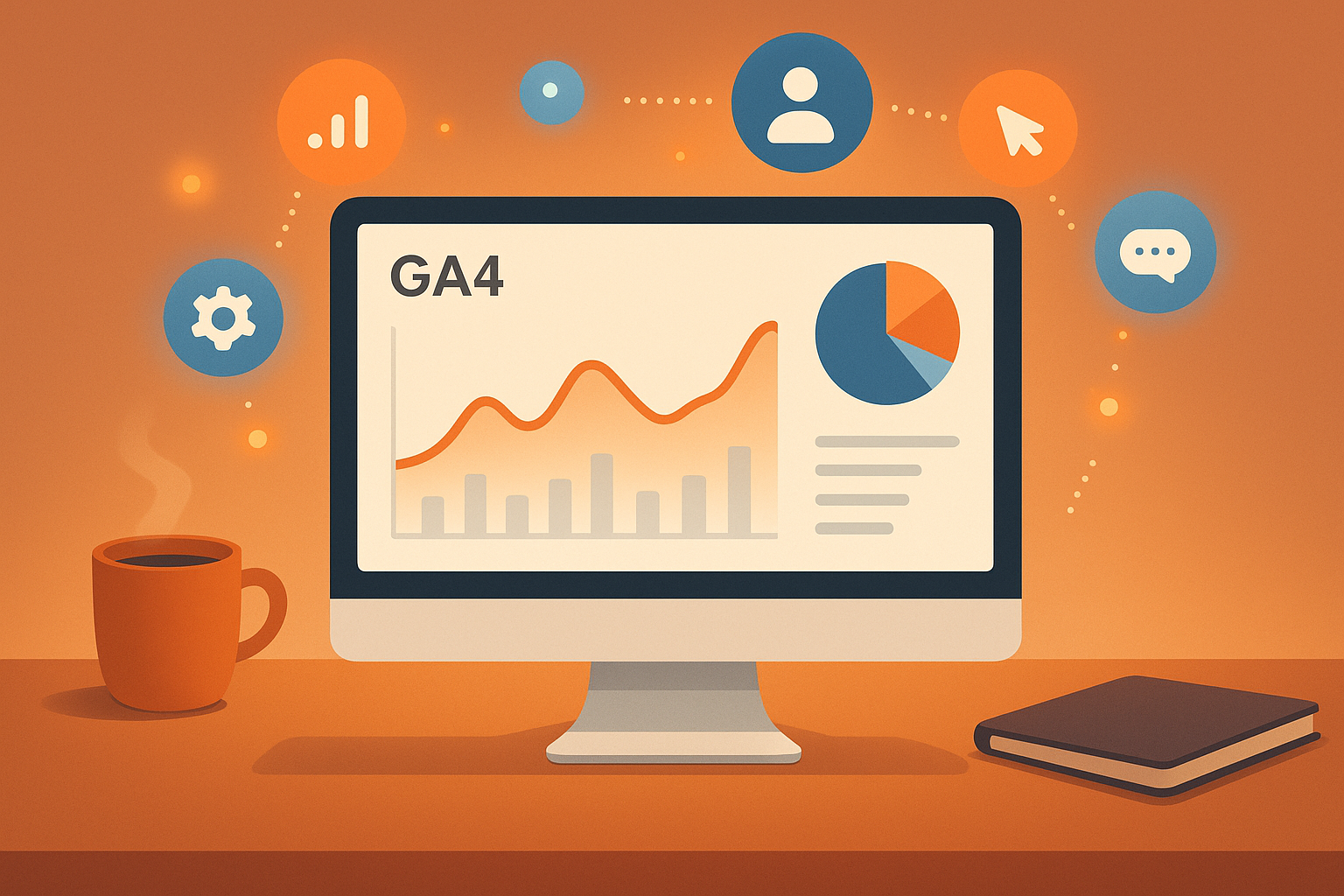Businesses today need AI tools to analyze customer behavior and deliver personalized experiences. This article highlights seven tools that excel in tracking behavioral data, integrating with existing systems, ensuring privacy compliance, and scaling with business needs. Here's a quick look:
- ChatGPT: Generates personalized content using natural language processing, integrates with platforms like Salesforce, and ensures data privacy.
- CustomGPT: Specializes in industry-specific chatbots and personalized strategies through behavioral data analysis.
- TensorFlow: An open-source framework for building custom AI models to analyze complex behavioral patterns.
- WEVO Pulse: Focuses on user experience analytics, combining behavioral data with user sentiment for actionable insights.
- Google's NotebookLM: Summarizes unstructured text like customer feedback for better understanding and personalization.
- HubSpot AI: Provides customer journey insights integrated into HubSpot's ecosystem.
- Persana AI: Analyzes email engagement data to improve communication strategies.
Each tool offers unique features tailored to different business needs, from email marketing to real-time customer engagement. Below, you'll find a detailed breakdown of their capabilities, privacy measures, and scalability.
Quick Comparison:
| Tool | Key Feature | Integration Options | Privacy Compliance | Scalability | Pricing |
|---|---|---|---|---|---|
| ChatGPT | Conversational insights | API integrations | SOC 2, GDPR/CCPA compliant | Enterprise-ready | Subscription-based |
| CustomGPT | Industry-specific chatbots | CRM and marketing tools | GDPR compliant | Scales with requirements | Contact vendor |
| TensorFlow | Custom AI models | Extensive API support | Self-managed compliance | Enterprise-level | Open-source |
| WEVO Pulse | User experience analytics | Web analytics tools | GDPR/CCPA compliant | Ideal for growing firms | Starts at $299/month |
| Google NotebookLM | Document insights | Google Workspace | Google privacy standards | Highly scalable | Free (beta) |
| HubSpot AI | Customer journey insights | HubSpot ecosystem | GDPR/CCPA compliant | Fits all business sizes | Included in HubSpot plans |
| Persana AI | Email engagement analysis | Gmail and workflows | GDPR compliant | Small to medium businesses | Contact vendor |
These tools cater to various business priorities, from email-focused strategies to broader customer journey insights. Choose based on your specific goals, privacy needs, and budget.
The Reality of AI Personalization at Scale: What, and When?
How to Choose AI Personalization Tools
Picking the right AI personalization tool can make or break your customer engagement strategy. A mismatched tool wastes time and money, while the right one can elevate how you connect with your audience. Here are the key factors to consider when evaluating your options.
Behavioral tracking capabilities are the backbone of any personalization tool. Look for platforms that can track and analyze customer interactions across multiple channels - like website visits, email activity, purchase history, and social media engagement. The best tools compile this data into dynamic customer profiles that update in real time.
Integration flexibility is crucial for a tool to work seamlessly with your existing systems. The top platforms come with robust APIs and pre-built connectors for widely used tools like Salesforce, HubSpot, Shopify, and Google Analytics. A lack of integration can lead to data silos, limiting the effectiveness of your efforts. Choose tools that can pull data from your CRM, email marketing software, e-commerce platform, and customer support systems all at once.
Privacy compliance and data security are non-negotiable in today’s regulatory environment. With laws like CCPA in California and emerging federal privacy standards, your chosen tool must handle data responsibly. This includes transparent data practices, easy consent management, and options for customers to access or delete their data. Look for features like SOC 2 compliance and encryption for data both in transit and at rest.
Scalability and performance are key as your business grows. The tool should be able to handle increasing amounts of data without slowing down or losing accuracy. Assess your current data needs and estimate growth over the next few years. Some tools perform well with smaller datasets but falter when processing millions of interactions daily.
Real-time processing capabilities are what set advanced AI tools apart from basic analytics platforms. Your tool should be able to analyze data and trigger personalized responses in milliseconds. This speed is critical for delivering timely product recommendations, dynamic content, and marketing messages that resonate with customers in the moment.
Machine learning sophistication varies widely between tools. Advanced platforms use deep learning to uncover complex behavioral patterns and predict customer actions with precision. They should also improve over time by learning from new data, rather than relying on static rules or simple segmentation.
Customization and control give you the ability to adapt the tool to your unique needs. Look for platforms that let you define custom triggers, create unique customer segments, and adjust rules based on your industry or business model. The more control you have, the better you can fine-tune your personalization efforts.
Reporting and analytics features are essential for tracking the success of your personalization strategy. Choose tools that provide clear metrics on engagement, conversions, and revenue attribution. These insights will help you identify what’s working and where adjustments are needed.
Finally, consider the overall cost - not just the subscription price, but also implementation, training, and maintenance. Think about the balance between technical complexity and user-friendliness, and calculate the total cost of ownership over a 12-month period.
For a detailed comparison of these features across different platforms, check out the Marketing Analytics Tools Directory. Up next, we’ll dive into some of the top AI personalization tools that incorporate these capabilities.
1. ChatGPT
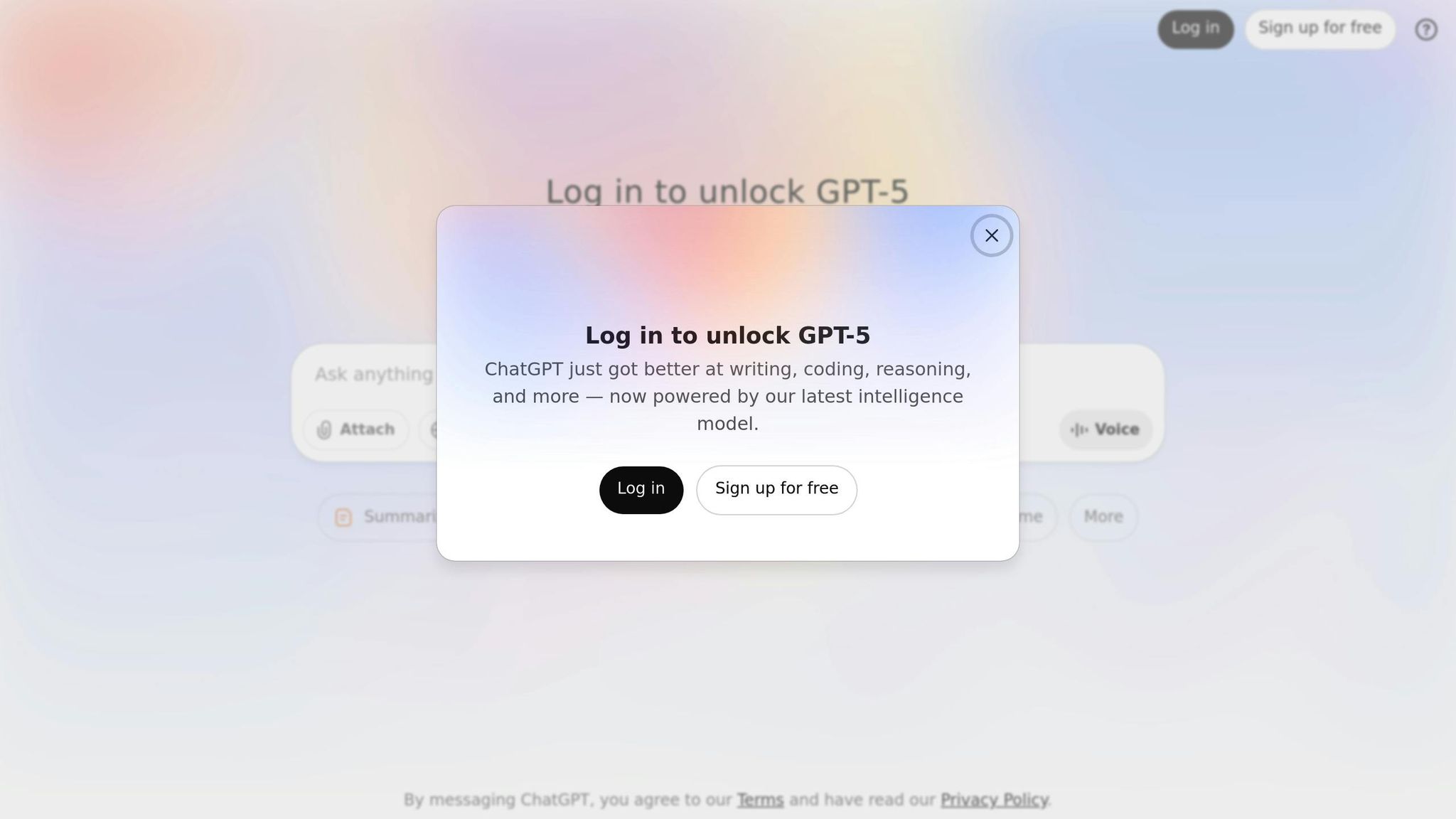
ChatGPT is an AI tool that businesses can use to personalize experiences based on customer behavior. Its standout feature is its ability to process natural language, analyze customer interactions, and create content tailored to specific audiences.
By working with unstructured data - like support tickets, social media comments, or survey responses - ChatGPT identifies behavioral patterns. For example, businesses can feed it customer interaction data to generate personalized email campaigns, product suggestions, or marketing messages that resonate with different audience segments. This functionality helps streamline how systems connect and share information.
Integration with Marketing Platforms
ChatGPT works seamlessly with marketing platforms through APIs and automation tools like Zapier or Make. These integrations connect it to CRMs, email platforms, and support systems, enabling automated responses based on customer behavior. For instance, if a customer abandons their shopping cart, ChatGPT can craft a follow-up email that reflects their browsing history or previous purchases. Importantly, robust privacy safeguards are in place to protect data during these exchanges.
Privacy Compliance and Data Security
For businesses handling sensitive customer data, ChatGPT offers enterprise-grade security features, including SOC 2 Type II compliance and GDPR/CCPA-compliant data processing agreements. Users can control data retention and even opt out of model training to maintain privacy. The enterprise version adds extra layers of security, such as single sign-on (SSO) and administrative controls, ensuring data is handled responsibly.
Scalability for Businesses of All Sizes
ChatGPT’s pricing model is designed to be flexible, making it suitable for small businesses while also scaling to meet enterprise demands. API pricing begins at $0.002 per 1,000 tokens for the GPT-3.5-turbo model, offering an affordable option for moderate data processing needs. For larger organizations, ChatGPT can manage millions of requests daily, thanks to its cloud infrastructure that automatically adjusts to workload demands. This makes it particularly useful for companies experiencing seasonal traffic spikes or rapid growth.
With its adaptable pricing and scalable setup, ChatGPT empowers businesses to move from basic customer support to advanced behavioral analysis with ease.
2. CustomGPT
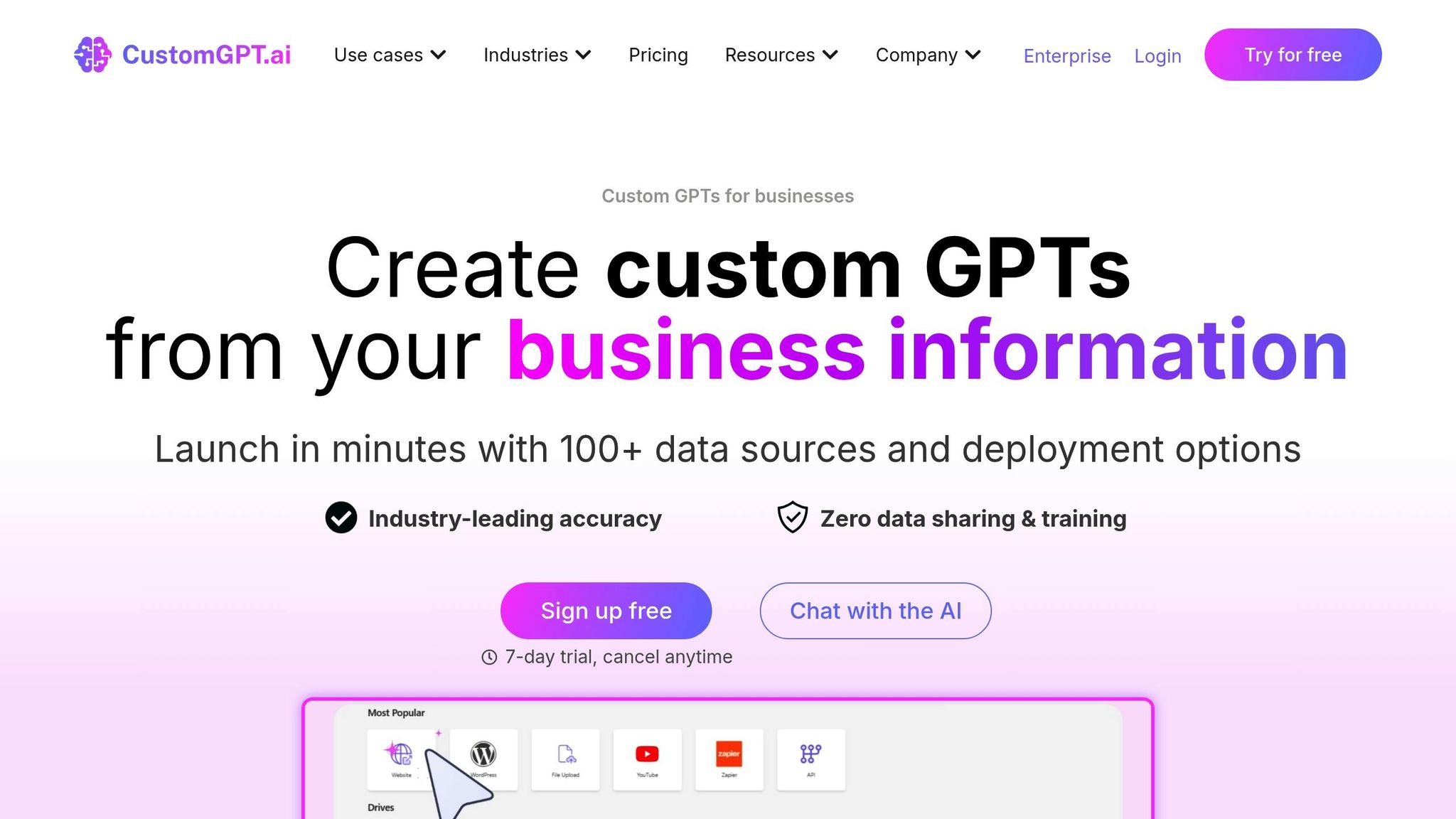
CustomGPT operates in a similar space to ChatGPT but focuses more on creating chatbots tailored to specific industries or domains. Its strength lies in using behavioral data to craft more personalized customer experiences.
Behavioral Analysis
CustomGPT gathers data from various customer interactions - like website activity and communication channels - to build detailed user profiles. These profiles help shape personalized strategies that align with user behavior.
Integration and Functionality
With its API, CustomGPT connects seamlessly to marketing automation tools. This allows businesses to deliver personalized recommendations across platforms, including websites, mobile apps, and email campaigns.
Privacy and Scalability
CustomGPT places a strong emphasis on securing training data while offering the flexibility to grow alongside an expanding customer base.
3. TensorFlow
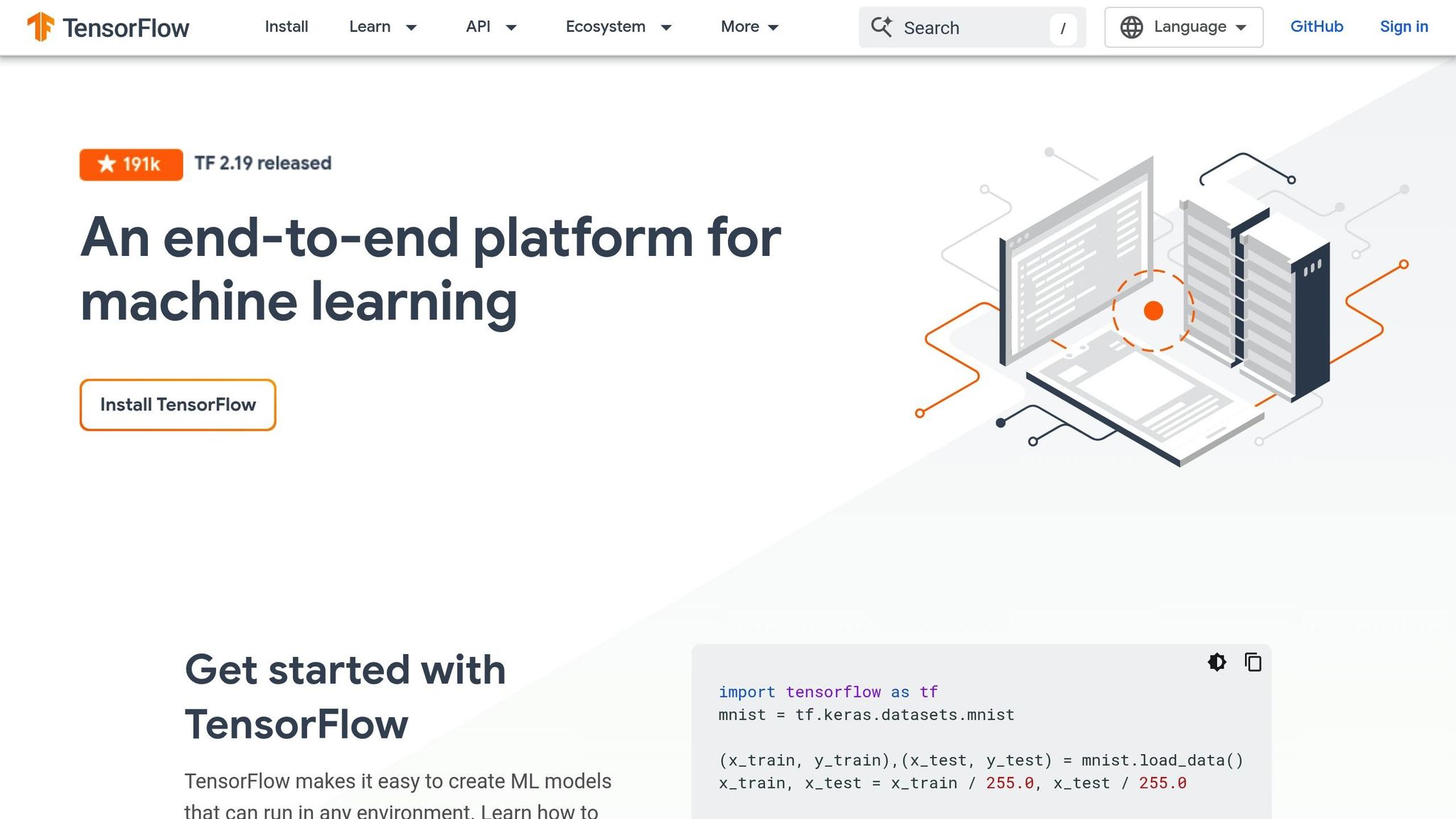
TensorFlow plays a key role in creating AI-driven personalization strategies, offering developers the tools they need to analyze user behavior. This open-source machine learning framework from Google enables the creation of custom AI models designed specifically for behavioral personalization, making it a powerful resource for marketers looking to tailor their campaigns.
Behavioral Tracking and Analysis
With TensorFlow, deep neural networks can process a variety of behavioral data - like click patterns, time spent on a page, purchase history, session recordings, and even text-based feedback. This analysis uncovers subtle trends and helps build detailed user profiles that can inform smarter marketing decisions.
Integration with Marketing Platforms
TensorFlow's flexible API makes it easy to integrate with existing marketing tools. It supports both batch and real-time data processing, allowing businesses to deliver personalized recommendations and dynamic content seamlessly.
Privacy Compliance and Data Security
TensorFlow incorporates advanced privacy features such as differential privacy and federated learning. These technologies enable secure data analysis without the need to centralize sensitive user information, ensuring compliance with privacy regulations.
Scalability for All Business Sizes
Whether you're a startup or a large enterprise, TensorFlow has you covered. Use TensorFlow Lite for mobile applications or TensorFlow Extended (TFX) for full-scale production pipelines. It also supports distributed computing and works with major cloud platforms, making it adaptable to a range of business needs.
4. WEVO Pulse
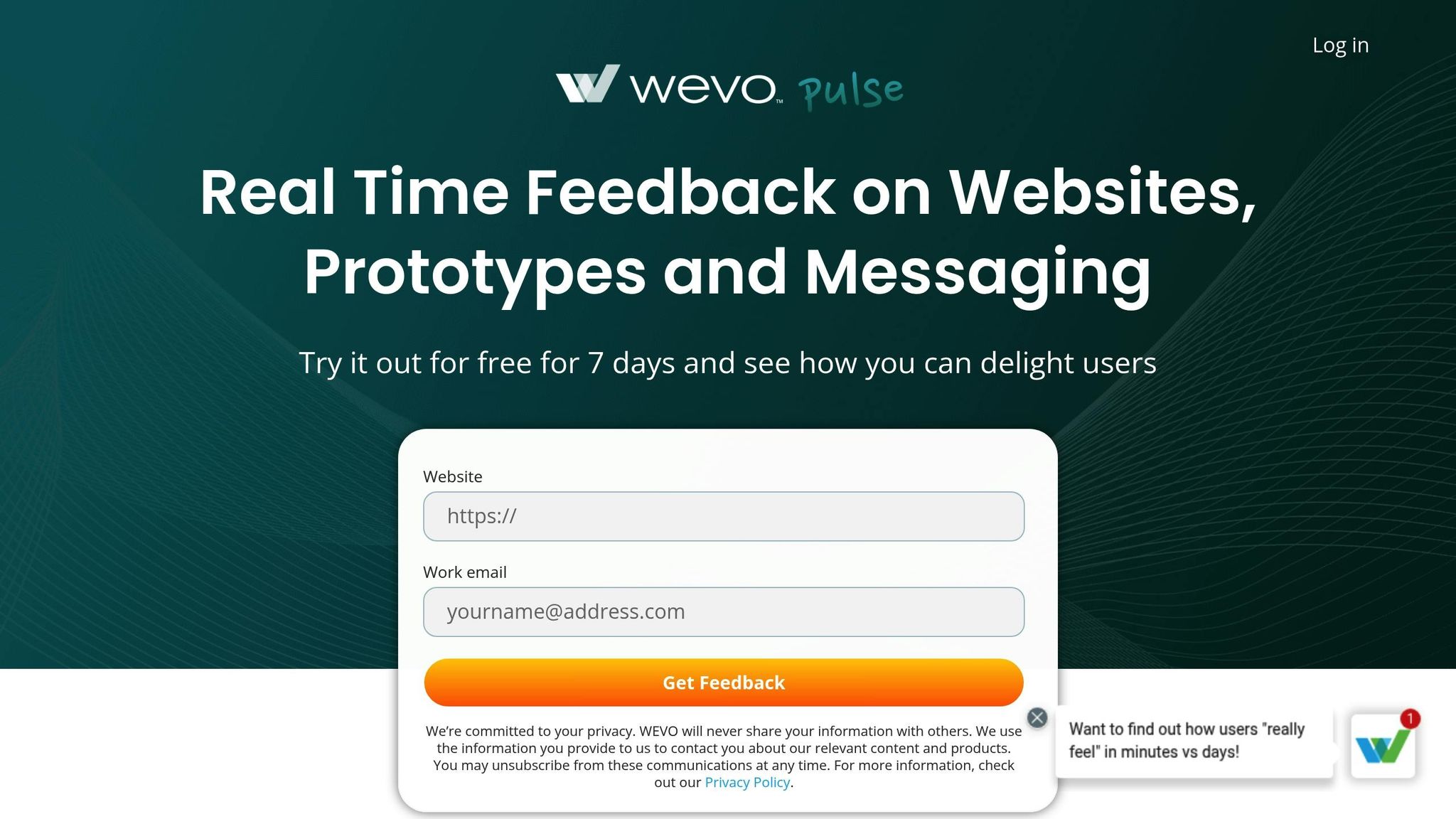
WEVO Pulse takes customer engagement to the next level by offering detailed insights into user behavior. By focusing on user experience analytics and gathering real-time feedback, the platform provides businesses with actionable data to create more personalized customer interactions.
What sets WEVO Pulse apart is its ability to analyze behavioral data through advanced user testing. It doesn’t just track what users do - it digs deeper, capturing micro-interactions, emotional reactions, and patterns in user journeys across digital platforms. By blending quantitative data with qualitative insights, and leveraging AI to assess user sentiment, the platform helps businesses understand the "why" behind customer actions. This dual perspective enables companies to predict engagement outcomes with greater accuracy.
Integration and Real-Time Insights
WEVO Pulse connects effortlessly with popular marketing automation tools and CRM systems through its API integrations. Its real-time data processing means businesses can instantly adapt to user behavior. For example, companies can adjust content, recommendations, or messaging on the fly as customers interact with their digital platforms. This level of immediacy ensures a more tailored and engaging user experience.
Data Privacy and Scalability
Privacy is a priority for WEVO Pulse, which adheres to GDPR and CCPA regulations using built-in consent management and data anonymization. The platform is also highly scalable, making it suitable for both small businesses and large enterprises. Its cloud-based infrastructure can handle varying data volumes, and pricing starts at $299 per month for basic features, with options to expand based on data processing and analytics needs.
sbb-itb-5174ba0
5. Google's NotebookLM
Google's NotebookLM is an experimental AI tool designed to help users organize and summarize documents using natural language. While it started as a tool for managing personal notes, it has evolved to extract meaningful insights from unstructured text, making it a powerful assistant for businesses and individuals alike.
Smarter Document Understanding and Assistance
NotebookLM uses conversational AI to break down complex documents - like customer feedback or support inquiries - into easy-to-digest summaries. It highlights key themes, making it easier to personalize responses or identify trends. This ability to transform unstructured text into clear takeaways underscores its potential to enhance customer interactions.
Seamless Integration with Google Workspace
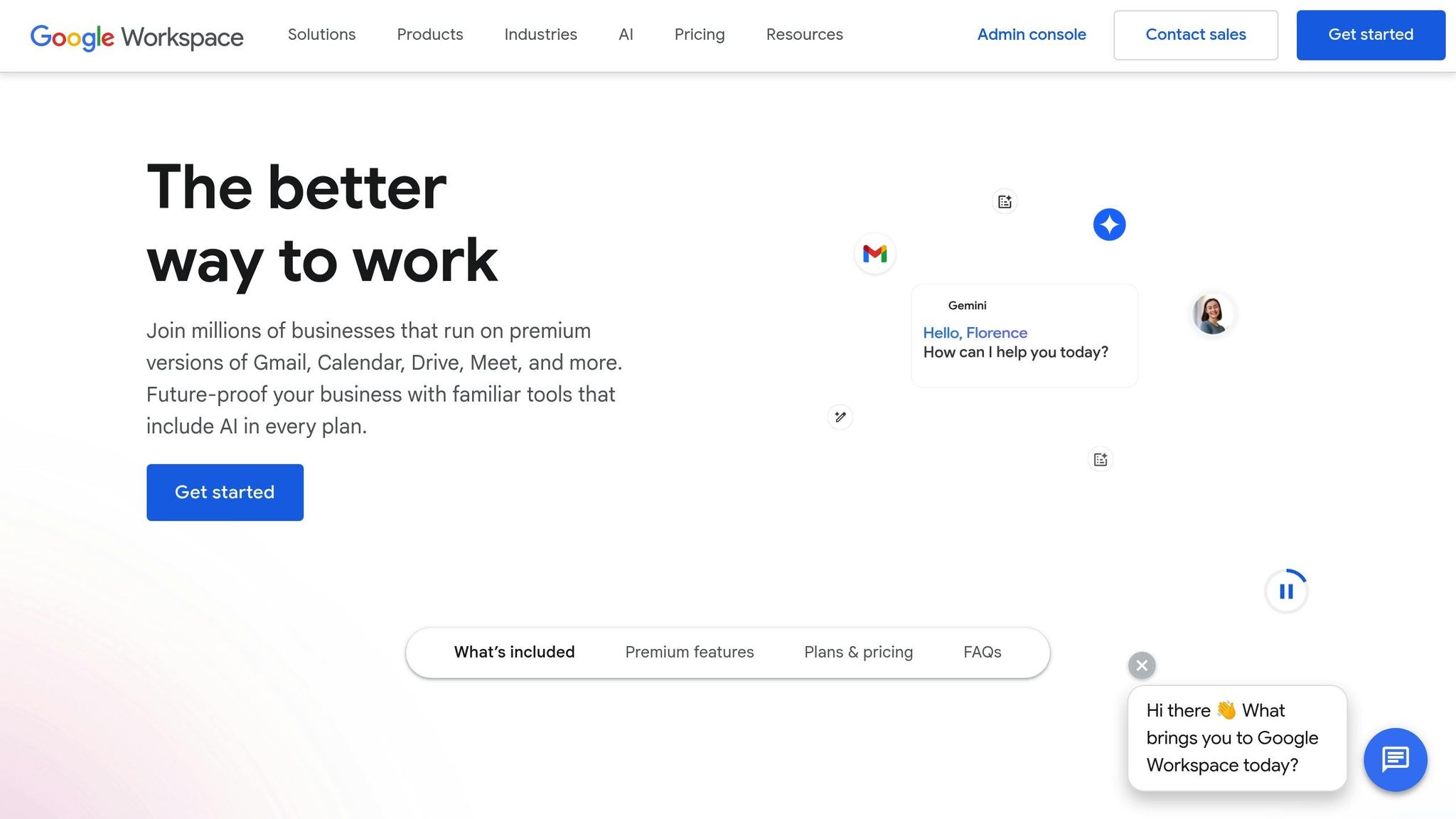
NotebookLM works effortlessly within Google Workspace, enabling users to integrate document insights directly into their existing workflows. Whether you're managing team projects or analyzing data, this tool ensures that valuable information is just a few clicks away, all within the apps you're already familiar with.
Built for Security and Growth
Running on Google's cloud infrastructure, NotebookLM provides enterprise-level security while adapting to your growing data needs. Its capability to scale alongside your operations makes it a reliable addition to Google's suite of tools, particularly for businesses looking to personalize their strategies with smarter data insights.
6. HubSpot AI
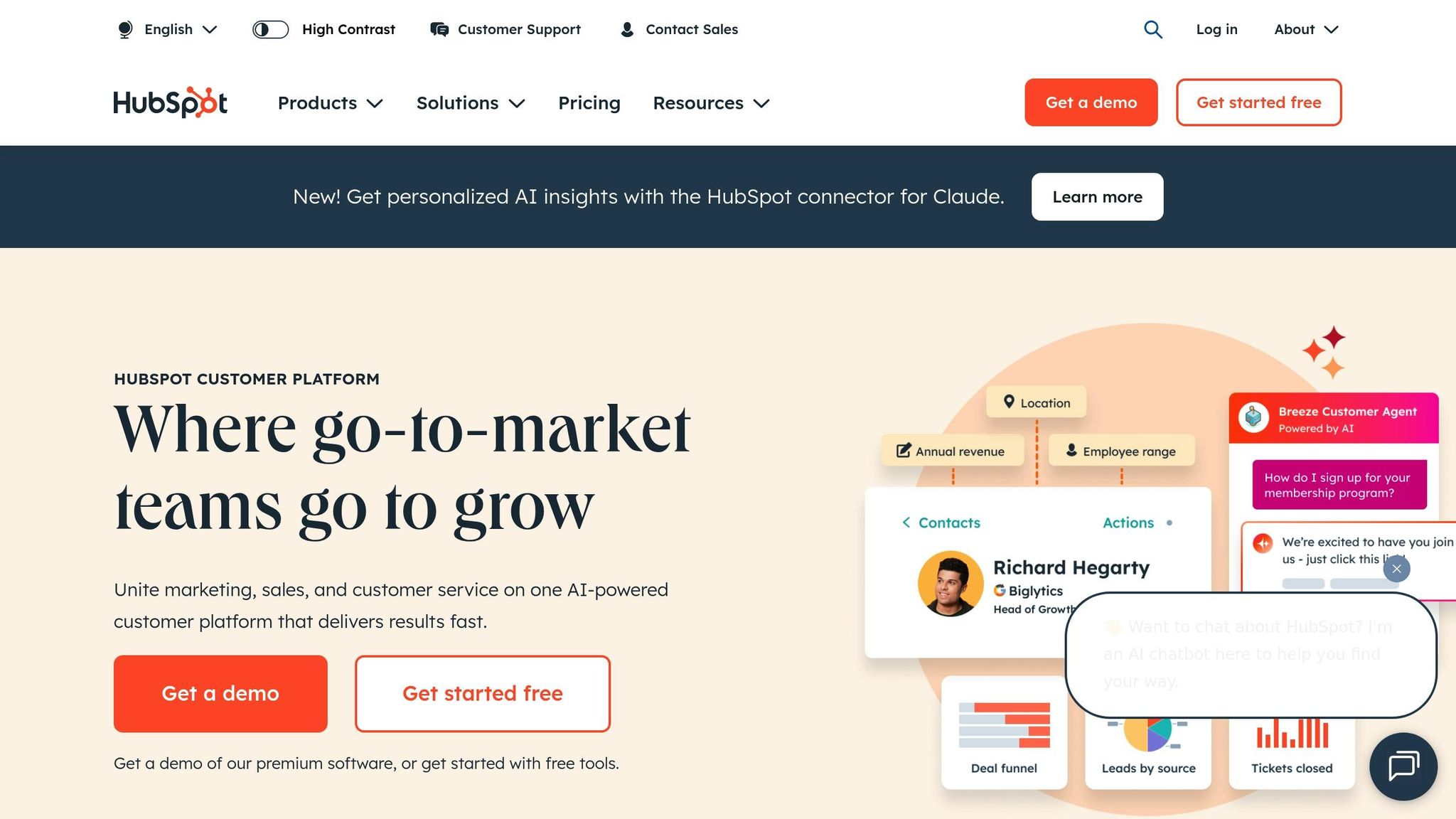
HubSpot AI offers a dynamic way to enhance customer experiences by combining the power of artificial intelligence with HubSpot's marketing, sales, and service platform. It’s designed to make personalization more effective and accessible for businesses of all sizes.
Behavioral Insights
By analyzing data from multiple channels, HubSpot AI uncovers patterns in customer behavior. These insights help businesses create interactions that feel timely and relevant at every stage of the customer journey.
Seamless Integrations
HubSpot AI is built to work effortlessly with other business tools, ensuring data flows smoothly between systems. This eliminates the hassle of manual syncing and allows businesses to focus on creating personalized experiences.
Data Privacy and Security
To maintain customer trust, HubSpot AI includes strong privacy controls and security features that align with regulatory standards. This ensures businesses can personalize their marketing while safeguarding sensitive information.
Flexible for Growth
Whether you’re running a small startup or managing a large enterprise, HubSpot AI grows with you. Its features evolve alongside your business, ensuring your personalization strategies stay effective as customer expectations shift.
7. Persana AI
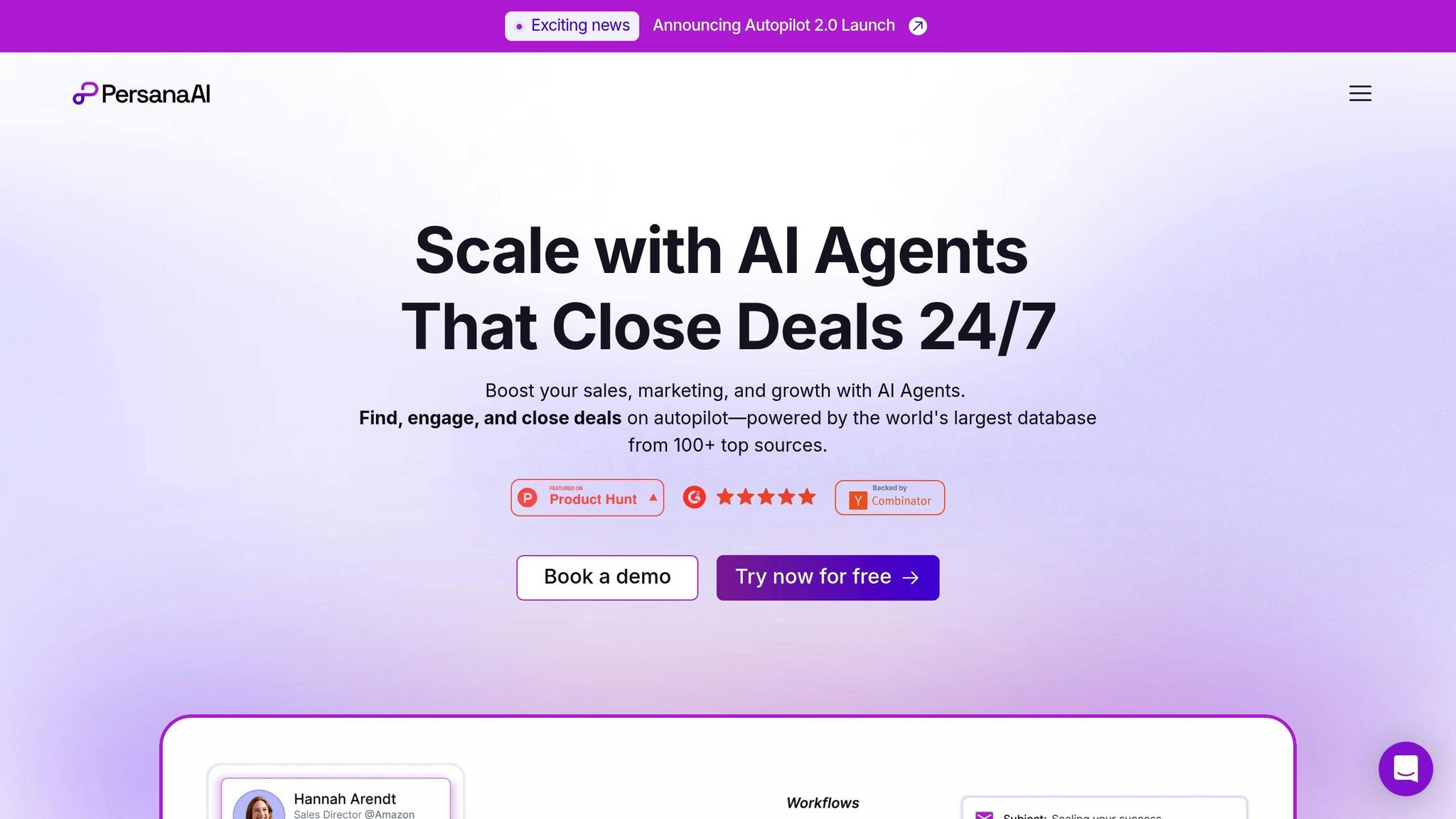
Persana AI focuses on using email engagement data to create more tailored and effective communication. By honing in on behavioral data, the platform specializes in analyzing email interactions to help businesses refine their customer outreach strategies. It achieves this by diving into key email metrics to enhance how companies connect with their audience.
Email Engagement Analysis
The platform keeps a close eye on important email engagement metrics, such as open rates and other Gmail-specific data. By analyzing these patterns, Persana AI builds detailed customer profiles. These insights seamlessly feed into broader marketing workflows, enabling sales and marketing teams to pinpoint the best timing and messaging for each individual customer.
Integration with Marketing Platforms
Persana AI integrates effortlessly with Gmail, aligning with existing sales and marketing workflows. The platform tracks engagement data, giving teams the ability to incorporate behavioral insights directly into their daily operations, streamlining processes and improving communication strategies.
Privacy Compliance and Data Security
Developed by Netla, Incorporated, Persana AI adheres to GDPR regulations, ensuring that personal data is handled responsibly. The platform retains data only as needed to meet legal requirements, resolve disputes, or enforce policies. It collects and uses personal information based on clear legal grounds, such as fulfilling contracts, obtaining user consent, legitimate business interests, or complying with legal obligations. For individuals in the European Economic Area (EEA), Persana AI guarantees comprehensive data protection rights, including access to data, updates, deletion, rectification, objection, restriction, data portability, and the ability to withdraw consent. Like other platforms in this space, Persana AI strikes a balance between powerful functionality and strict privacy standards.
Tool Comparison Chart
Here's a breakdown of seven tools evaluated across key factors like behavioral tracking, integration capabilities, privacy standards, scalability, and pricing. Use this chart as a quick-reference guide to match tools with your business needs.
| Tool | Behavioral Tracking | Integration Options | Privacy Compliance | Scalability | Pricing Model |
|---|---|---|---|---|---|
| ChatGPT | Provides conversational insights for personalization | API integrations available | SOC 2 Type II, GDPR/CCPA compliant | Highly scalable | Subscription-based (e.g., Plus plan) |
| CustomGPT | Offers customizable AI solutions tailored for personalization | Integrates with CRM and marketing platforms | GDPR compliant | Scalable based on implementation | Contact vendor for pricing |
| TensorFlow | Framework for building advanced behavioral models | Extensive API-driven integrations | Self-managed compliance | Enterprise-level scalability | Open-source (no licensing fees) |
| WEVO Pulse | Delivers insights into user behavior and experience | Connects with web analytics and testing tools | GDPR and CCPA compliant | Ideal for growing businesses | Tiered subscription model |
| Google's NotebookLM | Analyzes document interaction patterns for contextual insights | Integrates seamlessly with Google Workspace | Google privacy standards | Highly scalable | Free (currently in beta) |
| HubSpot AI | Tracks customer journey data comprehensively | Built-in integration with HubSpot ecosystem | GDPR and CCPA compliant | Enterprise-ready | Included with HubSpot plans |
| Persana AI | Focuses on email engagement behavior analysis | Connects with Gmail and marketing workflows | GDPR compliant with EEA considerations | Best for small to medium businesses | Contact vendor for pricing |
Key Takeaways
- ChatGPT and TensorFlow are ideal for enterprise-level needs. ChatGPT excels in conversational insights with subscription pricing, while TensorFlow’s open-source framework offers flexibility but requires technical expertise.
- HubSpot AI is a strong choice for businesses needing integrated customer journey analytics, especially for those already using HubSpot.
- For email engagement, Persana AI provides targeted insights and is well-suited for small to medium businesses.
- WEVO Pulse supports businesses scaling up, offering behavioral insights and integration with analytics tools.
- Google's NotebookLM is a free option (currently in beta) that fits seamlessly into Google Workspace for document-related insights.
- CustomGPT provides tailored AI solutions, though pricing depends on specific requirements.
When choosing a tool, consider your specific goals. For example, businesses prioritizing email marketing might lean toward Persana AI, while those focusing on customer journeys would benefit from HubSpot AI. If budget and flexibility are key, TensorFlow offers a no-licensing-fee option but requires a higher technical investment.
Conclusion
AI-driven behavioral personalization offers businesses groundbreaking ways to enhance customer experiences. The seven tools we've discussed each bring unique strengths to the table, from ChatGPT's conversational prowess to TensorFlow's powerful machine learning framework.
Choosing the right tool hinges on aligning its features with your business objectives. For instance, if email marketing is your focus, Persana AI's engagement analytics might be a perfect fit. On the other hand, businesses aiming for a more holistic view of the customer journey may lean toward HubSpot AI's integrated solutions. For organizations with the technical expertise and budget flexibility, TensorFlow's open-source framework provides endless customization possibilities without the burden of licensing fees.
It's also vital to consider privacy compliance in today’s regulatory climate. Ensure that any tool you evaluate meets your organization’s privacy policies and adheres to relevant regulations.
Scalability is another key factor. Tools like ChatGPT and TensorFlow are built to handle enterprise-level demands, while options like WEVO Pulse and Persana AI may be better suited for mid-sized businesses looking to grow.
Ultimately, the best tool is one that aligns seamlessly with your strategic priorities. For businesses in the U.S. navigating this landscape, the Marketing Analytics Tools Directory on topanalyticstools.com can be a valuable resource. This platform provides a structured comparison of leading marketing analytics tools, helping businesses evaluate solutions for real-time analytics, campaign tracking, and audience insights. With detailed feature breakdowns, it simplifies the decision-making process, ensuring you find the right fit for your needs.
The future of personalization lies in making informed choices. By understanding your data requirements, budget, and technical capabilities, you can turn customer interactions into meaningful, results-driven experiences.
FAQs
How do AI tools protect user data and comply with regulations like GDPR and CCPA?
AI tools protect user data and align with regulations like GDPR and CCPA by employing techniques such as data anonymization, encryption, and adhering to privacy-by-design principles. These safeguards are designed to keep sensitive information secure and prevent unauthorized access or misuse.
Many of these tools also offer features like consent management, data access controls, and audit trails, enabling businesses to manage data responsibly. These functions not only help meet legal obligations but also strengthen customer trust by showing a commitment to privacy and transparency.
What should businesses look for in an AI tool to personalize customer experiences using behavioral data?
When choosing an AI tool for behavioral data personalization, businesses should look for solutions that integrate smoothly with their existing data systems and handle real-time data processing. This approach ensures that personalization efforts are accurate and reflect up-to-the-minute customer behaviors.
Here are some key factors to keep in mind:
- Data privacy and security: The tool must comply with U.S. regulations to safeguard sensitive customer information.
- Scalability: Select a solution that can grow alongside your business and manage increasing amounts of data effectively.
- Ease of use: Go for tools that are intuitive and easy for your team to adopt without extensive training.
- Multi-channel support: Ensure the tool supports personalization across multiple platforms, including websites, emails, and mobile apps.
By prioritizing these elements, businesses can deliver personalized, data-driven experiences that resonate with individual customers.
Can these AI tools integrate with existing systems and scale as my business grows?
Yes, most AI tools designed for behavioral data personalization are created to work effortlessly with existing systems like CRM platforms, marketing automation tools, and data analytics software. They often come with APIs or pre-built connectors, making it easier to integrate them into your current workflows without causing disruptions.
In terms of scalability, these tools are usually built to manage increasing data volumes and user demands as your business grows. Many rely on cloud-based infrastructures, which allow them to adjust resources dynamically to handle larger datasets or more complex personalization needs. To ensure the tool fits your specific requirements, it's a good idea to review its documentation or reach out to the provider for confirmation on compatibility and scalability.


